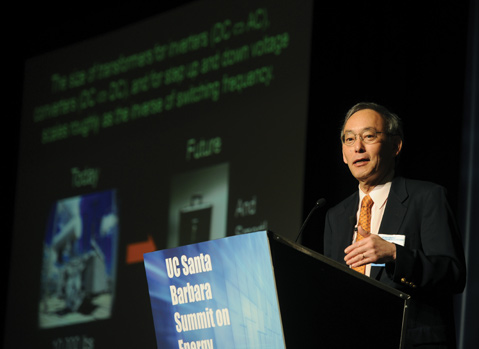Outgoing Energy Czar Speaks at Efficiency Summit
UCSB Hosts Steven Chu, Leading Innovators, and Titans of Industry in Two-Day Conference

The nation’s outgoing energy czar, Steven Chu, came to Santa Barbara on Wednesday to kick off UCSB’s Summit on Energy Efficiency, a two-day conference at the Fess Parker DoubleTree focused on innovations in the development of materials “for a more sustainable energy future.” Hosted by the university’s five-year-old Institute for Energy Efficiency and attended by more than 300 academics, emerging scientists, and established titans of the tech, energy, and manufacturing industries, the program’s panels ranged from solid state lighting and electrochemical energy storage to how the communications, utilities, and electronics worlds are incorporating efficiency into their business models.
Perhaps expected from the first scientist to ever lead the Department of Energy, Chu’s talk was highly technical in nature but proved to be a behind-the-scenes look at the science empowering efficiency leaps in the transportation, solar power, and battery industries. Highlighting areas where his department helped move innovations along as well as multiple places where American inventions were “swooped up” by foreign companies — including one mention of having to fight for patent rights in China — Chu emphasized that materials developments must go hand-in-hand with manufacturing. “We can’t only invent things in America — they have to be made in America,” urged Chu. “We’ve got to figure this out.”
In a “fireside chat” that followed, led by UCSB grad and Oracle chairman Jeff Henley, Chu discussed political hangups for efficiency progress (that elected officials like to cut ribbons in front of new factories rather than congratulate scientists on TV), the promise and pitfalls of natural gas (that it’s a good “transition fuel” but that we will need something new by the mid-century), the problem of the country importing much more than it exports for the past 25 years, and the controversial topic of fracking. “Hydraulic fracturing is still rapidly improving,” said Chu. “The good news is that the safety part is also improving and can be accelerated.”
The conference will continue on Thursday.



